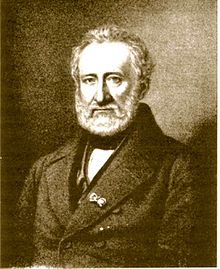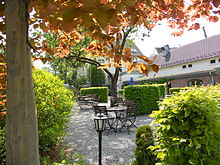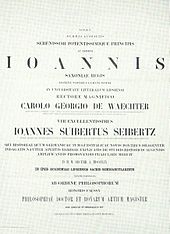Johann Suibert Seibertz
Johann Suibert Seibertz (born November 27, 1788 in Brilon , † November 17, 1871 in Arnsberg ) was a German lawyer and historian . He was Patrimonialrichter in Scharfenberg , judicial administrator in Rüthen and Belecke , judicial magistrate in Brilon, agriculture and Stadtgerichtsrat in Arnsberg.
Life
Suibert Seibertz was born in 1788 as the son of the clerk and chief tax collector Caspar Engelbert Josef Seibertz (1743-1822) and his wife Anna Maria Elisabeth Köchling (1749-1808) in the small town of Brilon. He got his first name, which is unusual for the area, because one of his godparents was a canon in the Kaiserswerth monastery, whose church was under the patronage of Suibert. The family belonged to the so-called educated bourgeoisie, it can be traced back to 1551. One brother died in 1791, just three days after birth; none of the other siblings reached adulthood. Seibertz spent his childhood in the house where he was born, the unused parsonage of the provost church . From 1792, at the age of four, until 1804 he attended school, first the Brilon boys' school, then the Petrinum grammar school in Brilon. The Petrinum was not unreservedly a full institution at the time, so Seibertz then moved to Düsseldorf . After graduating from grammar school, his parents sent him to Arnsberg to join Engelbert Arndt's secret council in order to give him an insight into the higher education bourgeoisie in Arnsberg. From 1805 to 1807 he studied law at the University of Giessen , although he was a Catholic. Then he moved to the University of Heidelberg . and received his doctorate as Dr. jur. et phil. In 1808 he attended lectures by Professors Anton Friedrich Justus Thibaut and Karl Salomo Zachariä , from this period evidence of performance has been handed down, they are in the Sauerland Museum in Arnsberg. After the dicasterial exam in spring 1810, his professional career began as an accessist at the court in Arnsberg. In 1811 he was appointed court attorney and procurator in Arnsberg, in that year he became engaged to Julie Arndts, a daughter of the court director Friedrich Arndts, and moved to Arnsberg. His future father-in-law died soon after, which plunged Seibertz into a religious crisis. He wrote to his friend Caspar Ulrich: I hate physical life so much, so disgusting because of its simple-minded end, that I can hardly find any value in it for other people to whom I owe myself. Our existence after death is so mysterious to me that I don't know whether to make an effort to prepare for it in this life . He overcame this crisis with the support of the dean Franz Böschen from Meschede. Seibertz then found his later Catholic attitude . The first publications in historical magazines were also made during this period. In order to relieve his father, who worked as a clerk and tax recipient in Brilon, he took over the tax receipt in Brilon in 1812 and was appointed tax recipient on October 30, 1815, after the resignation of his father. The Duchy of Westphalia fell to Prussia in 1816 and was divided into new tax districts, after which Seibert resigned from office. On June 13, 1812 in Arnsberg he married Maria Margaretha Juliana Antonette (Julie) Arndts (1794–1867) in Arnsberg, a daughter of the Arnsberg court director Friedrich Arndts . The children of this marriage were Engelbert (1813–1905, later painter), Siegbert (1815–1839), Adelbert (1816–1871), Bertha (1818–1912), Mechthilde (1822–1837) and Berthilde (1824–1848) . One of his grandchildren was the Berlin church architect Engelbert Seibertz .
On February 15, 1814, he began his judicial activity at the patrimonial court in Scharfenberg , which belonged to the Baron von Weichs. The court was withdrawn after the death of the last judge in 1819, but continued to exist as a royal court until Seibert transferred to the judicial office in Rüthen on June 9, 1820, with the administration of which he was entrusted. As a family man and husband, he did not take an active part in the Wars of Liberation, he was captain of the Hesse-Darmstadt Landwehr and in 1820 took his leave as second lieutenant in the Prussian Landwehr.
Suibert Seibertz acquired Wildenberg Castle in Brunskappel in 1817 , he expanded the estate considerably through the purchase and repurchase of landlord rights and the allodification of the feudal relationship. His legal knowledge came in handy during these sometimes complicated processes. He was appointed provisional judicial officer on December 12, 1823. In addition, until 1825, he also took over the provisional administration of the judicial office in Belecke . He received his definitive promotion to judicial officer on January 26, 1829. From September 1, 1830 he took over the management of the Brilon court as judicial officer.
He was also organizationally active in researching the regional history of Westphalia, together with Paul Wigand and Friedrich Joseph Sommer he was one of the 16 founding members of the Association for the History and Archeology of Westphalia.
From 1831 onwards he worked on the statutory rights of the Duchy of Westphalia on an official basis . In 1832 he was elected member of the state of the rural communities in the fourth Westphalian provincial parliament in the Lippstadt and Brilon districts. Until 1837 he was a member of the state parliament in Münster and a member of several committees. In some cases he was entrusted with the function of State Parliament Secretary. In 1837 Seibertz was able to uncover the embezzlement of one of his subordinate clerks in Brilon, which had a positive effect on him. He was appointed regional and city judge and transferred to the justice office in Arnsberg. The new office could not be exercised by Brilon, a move to Arnsberg became necessary. He moved to Arnsberg with his family and his library as well as extensive collections.
The Historical Society of Arnsberg was founded by him in 1838 and directed until his death. In the first decades of its existence, the association was active as a reading society and lecture association and organized 14-day meetings in the evening. Since 1862 there was also a club magazine, the sheets for the closer customer of Westphalia , which Seibertz looked after as publisher until 1871 and which were further published until 1884.
In 1850 the judiciary was reorganized and he received the first council position at the district court in Arnsberg. His official title was a district judge, the salary was 1,000 thalers. In 1859 he was awarded an honorary doctorate in philosophy from the University of Leipzig . In the same year he was accepted as a corresponding member of the Bavarian Academy of Sciences . In 1860 he was made an honorary doctorate from the University of Bonn . Seibertz retired in 1862, and died in 1871 shortly before he was 83. Seibertz is buried in the Eichholzfriedhof in Arnsberg.
plant
Suibert Seibertz dealt intensively with the history of Westphalia . He was also active as a bibliographer and writer.
He published his first essays as a historian in 1811 in the Vaterländische Blätter for the Duchy of Westphalia , which appeared in Arnsberg. Afterwards he wrote smaller treatises for the Westfälischer Anzeiger and for the Vaterländisches Archiv to promote the good and useful , for the Allgemeine Anzeiger der Deutschen and others. Seibertz took up some of the topics discussed in his old age, e.g. B. the legend of St. Hermann von Soest or thoughts about the master of the German order Wilhelm von Fürstenberg. The first major publication was the Westphalian Contributions to German History in two volumes, which were published in 1819 and 1823 by Taschè in Darmstadt. In the introduction to the first volume, Seibertz writes of a provincial writers ' lexicon; Friedrich Rassmann had already published a similar work in 1814 with the Münsterland writers' lexicon. Seibertz wanted to create the conditions for the appreciation of the literature of our fatherland . In 1831 the president of the Arnsberg court asked whether Seibertz was not ready to take over the processing of statuary rights for the Duchy of Westphalia. Seibertz agreed and was assigned to the trainee Fischer to relieve his judicial activities and to have time to obtain sources. Since then he has had access to all state, court and city archives on the instructions of the court. That was unusual because even civil servants working on behalf of the state were not granted access without further ado. Seibertz also used the access to the archives for his historical research, his work on statuary rights made only sluggish progress, the Minister of Justice repeatedly expressed his displeasure: Your current plan to publish a state and legal history of the Duchy of Westphalia and a Codex Diplomaticus, which all documents concerning the history and the constitution of the province contain, however important and desirable this work would be, because it lies entirely outside the mandate given to you ... which was limited to the collection and editing of the statuary rights . Although the minister recognized the benefits that would accrue to science through the addition of national and legal history, he insisted on preferring to do the work he had been assigned. Seibertz understood his task completely differently and wrote on April 25, 1836: I have toured all the communal archives of the country at my expense, wasted several months using the monastery archives in Arnsberg and Münster, copied well over 1000 documents, exerpized around 3000, I worked through many old handwritten codices, looked up all printed sources, which are scattered in more than 200 different works, at the same time took an equal part in the work of our judicial office ... with the other judges and worked on conducting business in a special way. In this way I have with continual sacrifices of money and time, so that I can no longer even use vacation to rest, but have to use them to work in the archives, and with the ruin of my eyes, which are so weak that if they relapse at the slightest cause of inflammation, which I suffered from for a month (!) last year, they achieve the following: I have brought together a very nice material for the history of the country and law. Subscriptions to patriotic men, after the state declined the requested support, secured the pressure of the source. The first half of the first volume is complete. The processing of the sources has progressed so far that I developed the doctrine of the Rüdener community of property ... in a printed dogmatic treatise. But because it was impossible to edit all the sources for a draft law, because I completely lacked the necessary time and calm, I am dissatisfied with this, Sr, Excellency of the Minister of Justice v. Kamptz has been shown . The book The Statuary and Customs Rights of the Duchy of Westphalia was then printed in 1839 and the official order from 1831 was done.
The main result of his years of research in the archives is not the book about the statuaries, but the state and legal history of the Duchy of Westphalia and especially the part with the documents. The first six volumes appeared from 1845 in the Ritterschen Buchhandlung publishing house in Arnsberg, the three-volume document book appeared from 1839. The other volumes were printed in 1843 and 1854.
Honors
- Knight of the Red Eagle Order III. Class with ribbon and the Order of the Crown III. class
- 1859 Honorary doctorate in philosophy from the University of Leipzig
- 1860 honorary doctorate from the University of Bonn
- 1860 honorary citizenship of the cities of Brilon and Neheim
- In 1862 he was honored with the medal for art and science.
Publications
As an author
- 1839 - The statutory and customary rights of the Duchy of Westphalia - 563 pages
- 1847 - Stud book of the Seibertz family zu Wildenberg and Brunscappell , Arnsberg 1847, Stein printing
- 1854 - History of the noblemen of Grafschaft , Arnsberg 1854, printed by HF Grote - 127 pages
-
Westphalian contributions to German history
- 1819 - 1. News about the writers of the Duchy of Westphalia.
- 1823 - 2. News about the writers of the Duchy of Westphalia.
-
State and legal history of the Duchy of Westphalia
- 1845 - 1. Diplomatic family history of the old Counts of Westphalia zu Werl and Arnsberg. - 279 pages
- 1855 - 2nd diplomatic family history of the dynasts and lords in the Duchy of Westphalia. - 434 pages
-
Document book on the regional and legal history of the Duchy of Westphalia
- 1839 - 1.799-1300 , 644 pages
- 1843 - 2. 1300–1400 , 706 pages
- 1854 - third from 1400 to 1800 , 658 pages
-
History of the country and its states
- 1860 - 1. The beginnings of Westphalian history up to the end of the Carolingians. (1-912). - 358 pages
- 1861 - 2. The times of prosperity and strength of the German Empire. 1. (912-1272). - 475 pages
- 1864 - 3. The times of prosperity and strength of the German Empire. 2. (912-1272). - 782 pages
- 1875 - 4.1. End of national history, from 1272 [1275] to 1508 / fortges. by Wilhelm Tobien - 140 pages
-
Sources of Westphalian history
- 1857 - 1st (volume) - 480 pages
- 1860 - 2nd (volume) - 480 pages
- 1869 - 3rd (volume) - 486 pages
- 1866 - Contributions to the history of Westphalia
Source, unless otherwise stated: Library Service Center Baden-Württemberg
As editor
-
Leaves for closer customer of Westphalia. Organ of the historical association for the Duchy of Westphalia.
- Vol. 1–3. Arnsberg: Stein 1862-1865.
- Vol. 4–9. Meschede: Harmann 1866–1871
Literature and Sources
- Robert Krumbholtz: Seibertz, Johann Suibert . In: Allgemeine Deutsche Biographie (ADB). Volume 33, Duncker & Humblot, Leipzig 1891, pp. 610-613.
- Heinrich Schauerte : Johann Suitbert Seibertz . In: Trutznachtigall. Heimatblätter for the Cologne Sauerland 3, 1921, 4, ZDB -ID 208489-2 , pp. 140-143.
- Harm Klueting : Johann Suibert Seibertz. 1788-1871 . In: Aloys Bömer (Ed.): Westfälische Lebensbilder . Volume 15. Aschendorff, Münster 1990, ISBN 3-402-06066-3 , ( Publications of the Historical Commission for Westphalia 17A, 15), pp. 135-164.
- Patrick Sensburg : The great lawyers of the Sauerland . 22 biographies of outstanding legal scholars. 1st edition. FW Becker, Arnsberg 2002, ISBN 978-3-930264-45-2 (276 pages).
- Harm Klueting: Seibertz, Johann Suibert. In: New German Biography (NDB). Volume 24, Duncker & Humblot, Berlin 2010, ISBN 978-3-428-11205-0 , p. 168 f. ( Digitized version ).
- Harm Klueting and Gerhard Brökel : Johann Suibert Seibertz. Life and work of the Westphalian historian. Kemmerling Druck, Brilon 1988.
Web links
- Online edition Seibertz: The statutory and customary rights of the Duchy of Westphalia
- Johann Suibert Seibertz in the Lexicon of Westphalian Authors
- Online edition Seibertz: Sources of Westphalian History
Individual evidence
- ^ Harm Klueting and Gerhard Brökel : Johann Suibert Seibertz life and work of the Westphalian historian. Kemmerling Druck Brilon 1988, pages 14 and 15
- ^ Harm Klueting and Gerhard Brökel : Johann Suibert Seibertz life and work of the Westphalian historian. Kemmerling Druck Brilon 1988, page 14
- ^ Harm Klueting and Gerhard Brökel : Johann Suibert Seibertz life and work of the Westphalian historian. Kemmerling Druck Brilon 1988, pages 14 to 18
- ↑ a b Harm Klueting and Gerhard Brökel : Johann Suibert Seibertz life and work of the Westphalian historian. Kemmerling Druck Brilon 1988, pages 20 and 21
- ^ Harm Klueting and Gerhard Brökel : Johann Suibert Seibertz life and work of the Westphalian historian. Kemmerling Druck Brilon 1988, pages 40 to 42
- ^ Harm Klueting and Gerhard Brökel : Johann Suibert Seibertz life and work of the Westphalian historian. Kemmerling Druck Brilon 1988, pages 24 to 28
- ^ Harm Klueting and Gerhard Brökel : Johann Suibert Seibertz life and work of the Westphalian historian. Kemmerling Druck Brilon 1988, pages 33 to 36
- ^ Johann Suibert Seibertz: Stud book of the Seibertz family to Wildenberg and Brunscappell . Arnsberg 1847, urn : nbn: de: hbz: 061: 1-34381 ( uni-duesseldorf.de [accessed on January 30, 2019]).
- ↑ SWB online catalog. Bibliotheksservice-Zentrum_Baden-Württemberg , accessed on January 30, 2019 (search for “Suibert Seibertz” (without “Johann”)).
- ^ Johann Suibert Seibertz (Hrsg.): Leaves for the closer customer of Westphalia . Organ of the historical association for the Duchy of Westphalia. Born 1861-1863. Stein, Arnsberg, urn : nbn: de: hbz: 6: 1-61718 ( uni-muenster.de [accessed January 30, 2019] digitized version contains all years from 1861 to 1884).
- ^ Johann Suibert Seibertz (Hrsg.): Leaves for the closer customer of Westphalia . Organ of the historical association for the Duchy of Westphalia. Born 1866-1871. Harmann, Meschede, urn : nbn: de: hbz: 6: 1-61718 ( uni-muenster.de [accessed on January 30, 2019] digitized version contains all years from 1861 to 1884).
| personal data | |
|---|---|
| SURNAME | Seibertz, Johann Suibert |
| BRIEF DESCRIPTION | German historian |
| DATE OF BIRTH | November 27, 1788 |
| PLACE OF BIRTH | Brilon |
| DATE OF DEATH | November 17, 1871 |
| Place of death | Arnsberg |









